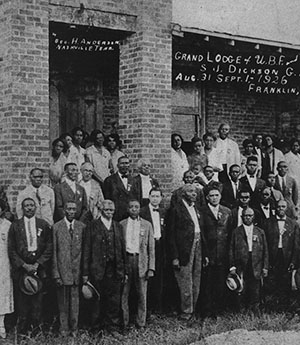Lodges

Fraternal and benevolent lodges were often important institutions in African American as well as in ethnic immigrant communities. They were not only a place to socialize but also offered a self-help philosophy that used membership dues to provide illness and burial benefits, even sponsoring the creation of cemeteries in some cases. Membership in fraternal groups grew in the post-Civil War decades to rival that of any other voluntary association, with the only possible exception being the church. Sociologist Howard Odum noted in 1910 that lodges prospered in towns as well as in rural areas, often becoming the center of community life. While the Prince Hall Masons, Grand United Order of Odd Fellows, Knights of Pythias, and United Brothers of Friendship enjoyed tremendous popularity throughout the state of Tennessee, other smaller, lesser-known groups also thrived here. The Mizpah Congregation Cemetery in Chattanooga was founded in 1866 by the Hebrew Benevolent Association, which was chartered in the State of Tennessee that same year. Some groups, such as the Independent Order of Immaculates and the Independent Pole Bearers Association, were founded in Tennessee and then spread to nearby states. Cemeteries and lodge halls associated with these groups still dot the landscape. The United Sons and Daughters of Charity Lodge Hall, Bolivar (Hardeman County) is listed on the National Register of Historic Places (see The Tennessee Encyclopedia of History and Culture for more information).
Related Content
See more images of African American lodges in the Southern Places collection.